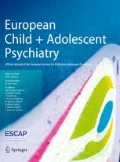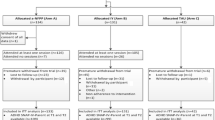Abstract
The revised new forest parenting programme (NFPP) is an 8-week psychological intervention designed to treat ADHD in preschool children by targeting, amongst other things, both underlying impairments in self-regulation and the quality of mother–child interactions. Forty-one children were randomized to either the revised NFPP or treatment as usual conditions. Outcomes were ADHD and ODD symptoms measured using questionnaires and direct observation, mothers’ mental health and the quality of mother–child interactions. Effects of the revised NFPP on ADHD symptoms were large (effect size >1) and significant and effects persisted for 9 weeks post-intervention. Effects on ODD symptoms were less marked. There were no improvements in maternal mental health or parenting behavior during mother–child interaction although there was a drop in mothers’ negative and an increase in their positive comments during a 5-min speech sample. The small-scale trial, although limited in power and generalizability, provides support for the efficacy of the revised NFPP. The findings need to be replicated in a larger more diverse sample.


Similar content being viewed by others
References
Barkley R, Murphy K (1998) Attention deficit hyperactivity disorder: a clinical workbook. The Guilford Press, New York
Bor W, Sanders MR, Markie-Dadds C (2002) The effects of the Triple P-Positive Parenting Program on preschool children with co-occurring disruptive behavior and attentional/hyperactive difficulties. J Abnorm Child Psychol 30:571–587
Brotman LM, Gouley KK, Chesir-Teran D, Dennis T, Klein RG, Shrout P (2005) Prevention for preschoolers at high risk for conduct problems: immediate outcomes on parenting practices and child social competence. J Clinic Child Adolesc Psychol 34:724–734
Brotman LM, Calzada E, Dawson-McClure S: GIPCI-R unpublished manuscript. New York University
Christiansen H, Chen W, Oades R, Asherson P, Taylor E et al (2008) Co-transmission of conduct problems with attention-deficit/hyperactivity disorder: familial evidence for a distinct disorder. J Neural Transm 115:163–175
Cohen J (1988) Statistical power analysis for the behavioral sciences. Lawrence Erlbaum Associates, Hillsdale
Conners CK, Epstein JN, March JS, Angold A, Wells KC, Klaric J, Swanson JM, Arnold LE, Abikoff HB, Elliott GR, Greenhill LL, Hechtman L, Hinshaw SP, Hoza B, Jensen PS, Kraemer HC, Newcorn JH, Pelham WE, Severe JB, Vitiello B, Wigal T (2001) Multimodal treatment of ADHD in the MTA: an alternative outcome analysis. J Am Acad Child Adolesc Psychiatry 40:159–167
Daley D, Sonuga-Barke EJS, Thompson M (2003) Assessing expressed emotion in mothers of preschool AD/HD children: psychometric properties of a modified speech sample. Br J Clin Psychol 42:53–67
Daley D, Jones K, Hutchings J, Thompson M (2009) Attention deficit hyperactivity disorder in preschool children: current findings, recommended interventions and future directions. Child Care Health Dev (in press)
Egger HL, Kondo D, Angold A (2006) The epidemiology and diagnostic issues in preschool attention-deficit/hyperactivity disorder—a review. Infants Young Child 19:109–122
Goldberg D (1982) General health questionnaire manual. NFER, Windsor
Greenhill L, Kollins S, Abikoff H, McCracken J, Riddle M, Swanson J, McGough J, Wigal S, Wigal T, Vitiello B, Skrobala A, Posner K, Ghuman J, Cunningham C, Davies M, Chuang S, Cooper T (2006) Efficacy and safety of immediate-release methylphenidate treatment for preschoolers with hyperactivity. J Am Acad Child Adolesc Psychiatry 45:1284–1293
Hardy G, Shapiro D, Haynes C, Rick J (1999) Validation of the general health questionnaire-12 using a sample of employees from England’s health care services. Psychol Assess 11:159–165
Hinshaw SP, Klein R, Abikoff H (2002) Nonpharmacologic treatments and their combination with medication. In: Nathan PE, Gorman J (eds) A guide to treatments that work, 2nd edn. Oxford University Press, New York, pp 3–23
Jacobson NS, Truax P (1991) Clinical-significance—a statistical approach to defining meaningful change in psychotherapy-research. J Cons Clin Psychol 59:12–19
Jensen PS, Arnold LE, Richters JE, Severe JB, Vereen D, Vitiello B, Schiller E, Hinshaw SP, Elliott RG, Conners CK, Wells KC, March J, Swanson J, Wigal T, Cantwell DP, Abikoff HB, Hechtman L, Greenhill LL, Newcorn JH, Pelham WE, Hoza B, Kraemer HC (1999) A 14-month randomized clinical trial of treatment strategies for attention-deficit/hyperactivity disorder. Arch Gen Psychiatry 56:1073–1086
Jones J, Daley D, Hutchings J, Bywater T, Eames C (2007) Efficacy of the incredible years basic parent training programme as an early intervention for children with conduct problems and ADHD. Child Care Health Dev 33:749–756
Kochanska G, Murray KT (2000) Mother-child mutually responsive orientation and conscience development: from toddler to early school age. Child Dev 71:417–431
Kollins S, Greenhill L, Swanson J, Wigal S, Abikoff H, McCracken J, Riddle M, McGough J, Vitiello B, Wigal T, Skrobala A, Posner K, Ghuman J, Davies M, Cunningham C, Bauzo A (2006) A rationale, design and methods of the preschool ADHD treatment study (PATS). J Am Acad Child Adolesc Psychiatry 45:1275–1283
Murphy K, Barkley R (1996) Attention deficit hyperactivity disorder in adults: comorbidities and adaptive impairments. Compr Psychiatry 37:393–401
Nowak C, Heinrichs N (2008) A comprehensive meta-analysis of triple p-positive parenting program using hierarchical linear modelling: effectiveness and moderating variables. Clin Child Fam Psychol Rev 11:114–144
Piccinelli M, Bisoffi G, Bon M, Cunico L, Tansella M (1993) Validity and test-retest reliability of the Italian version of the 12-item general health questionnaire in general practice: a comparison between three scoring methods. Comp Psychiatry 34:198–205
Psychogiou L, Daley D, Thompson M, Sonuga-Barke E (2008) Do maternal attention-deficit/hyperactivity disorder symptoms exacerbate or ameliorate the negative effect of child attention-deficit/hyperactivity disorder symptoms on parenting? Dev Psychopathol 20:121–137
Richman N (1977) Is a behaviour check list for preschool children useful? In: Graham PJ (ed) Epidemiological approaches to child psychiatry. Academic Press, London, pp 125–136
Rogers SJ (2000) Interventions that facilitate socialization in children with autism. J Autism Dev Disord 30:399–409
Routh D (1978) Hyperactivity. In: Magrab P (ed) Psychological management of paediatric problems, 2nd edn. University Park Press, Baltimore
Sonuga-Barke EJS, Thompson M, Daley D, Laver-Bradbury C (2004) Parent training for attention deficit/hyperactivity disorder: is it as effective when delivered as routine rather than as specialist care? Br J Clin Psychol 43:449–457
Sonuga-Barke E, Daley D, Thompson M (2002) Does maternal AD/HD reduce the effectiveness of parent training for pre-school children’s AD/HD? J Am Acad Child Adolesc Psychiatry 41:696–702
Sonuga-Barke EJS, Thompson M, Stevenson J, Viney D (1997) Patterns of behaviour problems among pre-school children. Psychol Med 27:909–918
Sonuga-Barke EJS, Daley D, Thompson M, Laver-Bradbury C, Weeks A (2001) Parent-based therapies for preschool attention-deficit/hyperactivity disorder: a randomized, controlled trial with a community sample. J Am Acad Child Adolesc Psychiatry 40:402–408
Sonuga-Barke EJS, Sergeant J, Nigg J, Willcutt E (2008) executive dysfunction and delay aversion in attention deficit hyperactivity disorder: nosological and diagnostic implications. Child Adolesc Psychiatryic Clin North Am 17:367–384
Sonuga-Barke EJS, Thompson M, Abikoff H, Miller Brotman L, Klein R (2006) Non-pharmacological interventions for preschool ADHD: the case for specialized parent training. Infants Young Child 19:142–153
Sonuga-Barke EJS, Lamparelli M, Stevenson J, Thompson M, Henry A (1994) Pre-school behaviour problems and intellectual attainment; the associations of hyperactivity and conduct problems. J Child Psychol Psychiatry 35:949–960
Swanson JM, McBurnett K, Wigal T, Pfiffner LA, Lerner MA, Williams L, Christian DL, Tattina L, Willicutt E, Crowley K, Clevenger W, Khounzana N, Woo C, Crinella F, Fisher TD (1993) Effect of stimulant medication on children with attention-deficit disorder: a review of reviews. Except Child 60:154–162
Taylor EA, Sandberg S, Thorley G, Giles S (1991) The epidemiology of childhood hyperactivity. Institute of Psychiatry Maudsley Monographs, Oxford University Press, London
Thompson MJJ, Stevenson J, Sonuga-Barke E, Nott P, Bhatti Z, Price A, Hodswell M (1996) The mental health of pre-school children and their mothers in a mixed urban/rural population. 1. Prevalence and ecological factors. Br J Psychiatry 168:16–20
van den Hoofdakker BJ, Van der Veen-Mulders L, Sytema S, Emmelkamp PMG, Minderaa RB, Nauta MH (2007) Effectiveness of behavioral parent training for children with ADHD in routine clinical practice: a randomized controlled study. J Am Acad Child Adolesc Psychiatry 46:1263–1271
van der Oord S, Prins PJM, Oosterlaan J, Emmelkarnp PMG (2007) Does brief, clinically based, intensive multimodal behaviour therapy enhance the effects of methylphenidate in children with ADHD? Eur Child Adolesc Psychiatry 16:48–57
Webster-Stratton C, Reid MJ, Stoolmiller M (2008) Preventing conduct problems and improving school readiness: evaluation of the incredible years teacher and child training programs in high-risk schools. J Child Psychol Psychiatry 49:471–488
Wigal T, Greenhill L, Chuang S, McGough J, Vitiello B, Skrobala A, Swanson J, Wigal S, Abikoff H, Kollins S, McCracken J, Riddle M, Posner K, Ghuman J, Davies M, Thorp B, Stehli A (2006) Safety and tolerability of methylphenidate in preschool children with ADHD. J Am Acad Child Adolesc Psychiatry 45:1294–1303
Zito JM, Safer DJ, Dosreis S, Gardner JF, Boles M, Lynch F (2000) Trends in the prescribing of psychotropic medications to preschoolers. J Am Med Assoc 23:1025–1030
Acknowledgments
The project was funded by The Island of Guernsey Research Fund through Wessex Medical Trust HOPE to MT, ES-B, LP, PT. We would like to thank the health visitors and other health staff on the Island of Guernsey for supporting our project and the help we were given from the press of Guernsey for promoting the project. Lastly we would like to thank all the families who took part.
Author information
Authors and Affiliations
Corresponding author
Rights and permissions
About this article
Cite this article
Thompson, M.J.J., Laver-Bradbury, C., Ayres, M. et al. A small-scale randomized controlled trial of the revised new forest parenting programme for preschoolers with attention deficit hyperactivity disorder. Eur Child Adolesc Psychiatry 18, 605–616 (2009). https://doi.org/10.1007/s00787-009-0020-0
Received:
Accepted:
Published:
Issue Date:
DOI: https://doi.org/10.1007/s00787-009-0020-0




